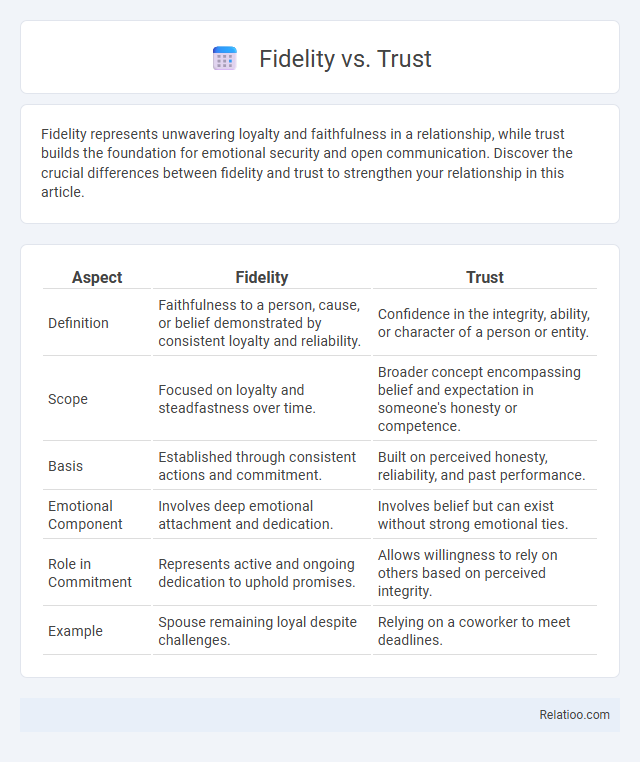Fidelity represents unwavering loyalty and faithfulness in a relationship, while trust builds the foundation for emotional security and open communication. Discover the crucial differences between fidelity and trust to strengthen your relationship in this article.
Table of Comparison
| Aspect | Fidelity | Trust |
|---|---|---|
| Definition | Faithfulness to a person, cause, or belief demonstrated by consistent loyalty and reliability. | Confidence in the integrity, ability, or character of a person or entity. |
| Scope | Focused on loyalty and steadfastness over time. | Broader concept encompassing belief and expectation in someone's honesty or competence. |
| Basis | Established through consistent actions and commitment. | Built on perceived honesty, reliability, and past performance. |
| Emotional Component | Involves deep emotional attachment and dedication. | Involves belief but can exist without strong emotional ties. |
| Role in Commitment | Represents active and ongoing dedication to uphold promises. | Allows willingness to rely on others based on perceived integrity. |
| Example | Spouse remaining loyal despite challenges. | Relying on a coworker to meet deadlines. |
Understanding Fidelity and Trust: Key Definitions
Fidelity refers to the accuracy and faithfulness in maintaining commitments or promises, often in contexts like relationships or data integrity. Trust involves the confidence or belief in someone's reliability and honesty, forming the foundation for ongoing interactions. Understanding these distinctions enhances communication by clarifying expectations and strengthening interpersonal or transactional bonds.
The Relationship Between Fidelity and Trust
Fidelity and trust are deeply interconnected in any relationship, with fidelity serving as a tangible expression of trustworthiness and commitment. Your ability to remain faithful reinforces the confidence others place in you, creating a stable foundation for lasting bonds. Breaches of fidelity often lead to a breakdown of trust, illustrating the crucial role fidelity plays in maintaining strong interpersonal connections.
Fidelity vs Trust: Core Differences
Fidelity refers to unwavering loyalty and faithfulness in relationships, often emphasizing consistent support and adherence to commitments, while trust centers on the belief in the reliability, honesty, and integrity of another party. Fidelity is demonstrated through actions that reinforce commitment over time, whereas trust is built through experiences that confirm dependability and truthfulness. Understanding this distinction helps clarify how emotional bonds are maintained through ongoing fidelity and how trust establishes the foundation for those bonds.
How Fidelity Builds Trust in Relationships
Fidelity in relationships establishes a consistent pattern of loyalty and honesty, which forms the foundation for deep trust between partners. Demonstrating fidelity through reliable actions and emotional commitment reassures both parties, reducing insecurity and fostering a secure emotional connection. This unwavering faithfulness cultivates an environment where trust can grow, enabling stronger and more resilient relational bonds.
The Role of Trust in Maintaining Fidelity
Trust serves as the foundational element that ensures fidelity by fostering confidence and reliability in relationships or agreements. Your ability to maintain fidelity depends heavily on the presence of trust, which reduces doubts and reinforces commitment. Without trust, fidelity becomes fragile and difficult to sustain over time.
Fidelity and Trust in Personal Relationships
Fidelity and trust are foundational elements in personal relationships, where fidelity ensures loyalty and faithfulness between partners, reinforcing emotional security and commitment. Trust develops through consistent honesty and reliability, enabling open communication and a deeper connection that sustains the relationship over time. Your ability to nurture both fidelity and trust creates a strong bond that withstands challenges and fosters lasting intimacy.
Fidelity and Trust in Professional Settings
Fidelity in professional settings refers to the accuracy, loyalty, and faithfulness with which employees and organizations adhere to their commitments, policies, and ethical standards. Trust is built through consistent fidelity, enhancing collaboration, communication, and overall workplace reliability. High fidelity in following protocols and transparent behavior fosters a culture of trust, essential for effective leadership and client relationships.
Common Challenges: Betrayal and Broken Trust
Betrayal and broken trust frequently challenge relationships involving fidelity, causing emotional distress and lasting damage. Trust is foundational but fragile, often compromised by deceit, infidelity, or inconsistent behavior, which undermines the bond between individuals. Addressing these challenges requires transparent communication and consistent actions to rebuild confidence and restore relational stability.
Rebuilding Trust After a Breach of Fidelity
Rebuilding trust after a breach of fidelity involves transparent communication, consistent honest behavior, and demonstrating accountability over time. Your willingness to acknowledge mistakes and actively work towards restoring integrity is crucial for mending the relationship. Trust recovery relies on sustained efforts to reaffirm commitment and reliability following the violation of fidelity.
Strengthening Fidelity and Trust for Lasting Bonds
Strengthening fidelity and trust forms the foundation for lasting bonds by fostering consistent reliability and unwavering loyalty. Effective communication and transparent actions reinforce mutual confidence, creating an environment where commitment thrives. Prioritizing these elements cultivates deep emotional connections that sustain relationships through challenges and growth.

Infographic: Fidelity vs Trust
 relatioo.com
relatioo.com